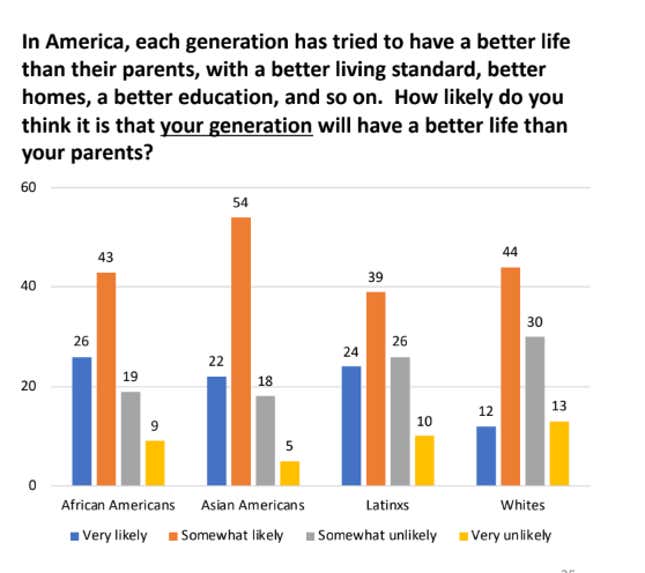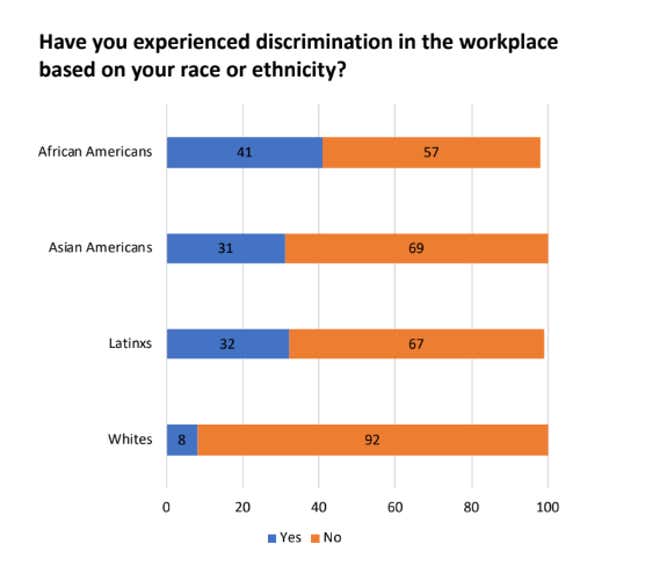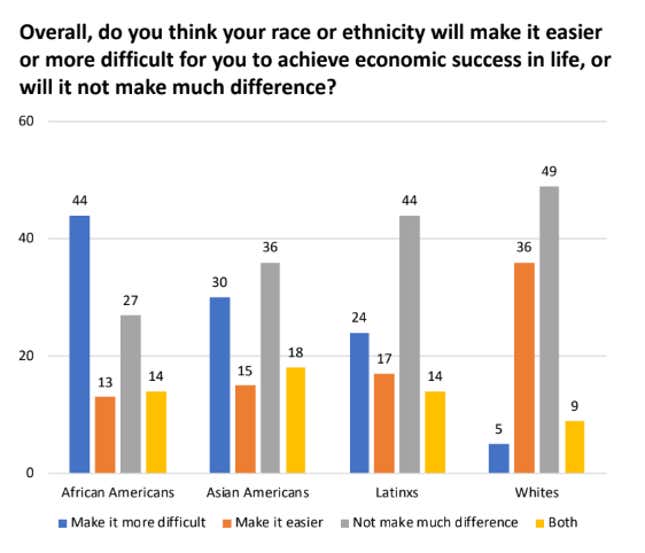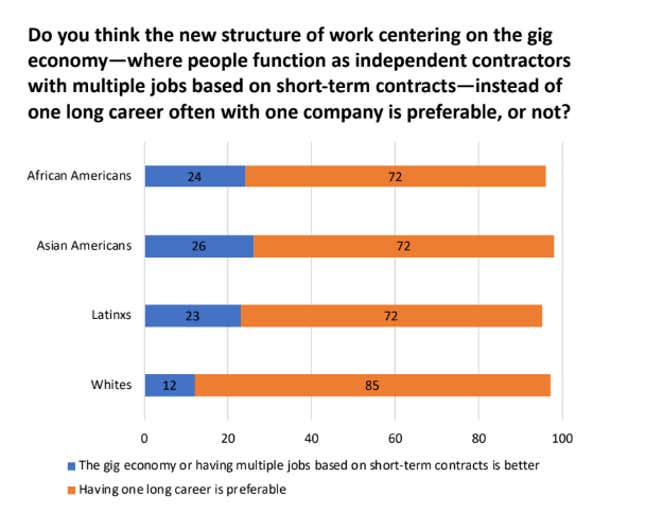
Think of a millennial in the workplace, and a host of stereotypes probably pop up. Maybe you envision a beanie-clad, kombucha-swilling engineer hunched over a laptop in an open office. Or maybe a 30-something manager sorting invoices over cold avocado toast. Or maybe you picture someone juggling a bunch of gig jobs: wrapping up a few hours of freelancing at home before picking up a quick Uber shift.
A new study wants to add more nuance to that picture, illuminating the ways race and ethnicity shape millennial experiences and values in the workplace.
“The idea of a millennial that a person has in their heads doesn’t necessarily reflect the reality of that generation,” says Vladimir Medenica, one of the researchers behind a new study put out by GenForward, a survey that specializes in researching millennials through the lens of race and ethnicity. Completed last month, the comprehensive survey probes how millennials feel about the work they’re doing, how they feel about it, and their political views about work.
The study also disaggregates data between different racial and ethnic identities—African-American, white, Asian, and Latinx—revealing fault lines in how optimistic millennials are about their job prospects compared to their parents, and whether they think they’re able to access good jobs.
African American respondents were more likely than most groups to report feeling optimistic about their personal futures, despite also being the group most likely to say their race or ethnicity will make it more difficult for them to achieve economic success. And even more concerning, says Medenica, were the relatively high numbers of Latinx and black millennials who reported not being able to access good jobs.
According to the GenForward survey, more than a third of black Americans said there were either no good jobs in their area, or they couldn’t access the good jobs available because they couldn’t drive or use public transport to get to them. The number was highest for Latinx respondents, with 44 percent reporting they couldn’t access good jobs.
“We find that African-American millennials and Latinx millennials are in a much more economically precarious position, so they have less access to good jobs,” Medenica said of the results. Overall, the findings highlight how deeply race and ethnicity affect millennials in the workplace, despite being the most diverse bloc of workers the U.S. has known.
“Instead of being special or different as a generation as they often are labeled, the patterns that we see by race and ethnicity among millennials are really similar to the patterns that we see in the general population,” he said.
Here are some of the major takeaways:
White millennials least likely to be optimistic about the future
Despite citing a lack of access to good jobs, 66 percent of black and Latinx millennials polled said they think they would personally do better than their parents economically. Among all groups, Asian Americans were the most confident, at 69 percent, while only a slim majority of white millennials, 53 percent, thought this would be the case for them.
The same pattern held up when millennials were asked how they thought their generation would fare in terms of having a higher standard of living than their parents. Again, most millennials agreed that they would have a better life than their parents; more than a quarter of black millennials considered it “very” likely, while another 43 percent thought it was “somewhat” likely. Generally, they were less optimistic than Asian Americans but more than Latinx and white millennials.
A plurality of white millennials believed their generation would fare somewhat better than their parents’, though nearly a third believed it was “somewhat unlikely” they’d have a better life than their parents.

This was despite white millennials being among the most likely to report confidence in finding a good job if they needed, working a second job or being laid off from a previous job.
Workplace protection—and working twice as hard
The good news is that most millennials feel at least somewhat confident that they can find a good job if they need to: three-out-of-four black and Latinx millennials report some confidence, compared to 79 percent of Asian Americans and white millennials.
But there were considerable divides in how millennials of different races felt their race or ethnicity impacted their economic success, and in their general vulnerability at work.
Of all race and ethnic groups, black millennials were most likely to believe their racial identity would hinder their ability to succeed financially, with nearly half reporting that being black would make it more difficult for them to reach their economic goals. They were also most likely to say they had experienced discrimination in the workplace based on their race, with 41 percent saying they had experienced some form of discrimination at their job.
Only 8 percent of white millennials reported feeling discriminated against because of their race.

Asian Americans were the second most likely to be anxious about their background negatively impacting economic success, at 30 percent, followed by Latinx millennials at 24 percent.
Not surprisingly, only five percent of white millennials believed their race would make it more difficult to prosper in life, while more than a third acknowledged it could make achieving economic success easier. However, a plurality of white millennials—49 percent—thought their race didn’t matter much at all.

But several other responses cut at that premise. More than a quarter of black millennials reported having been laid off from a job before—the highest of any race or any ethnic group. It should be noted that the rates for Latinx and white millennials weren’t far behind, with 22 and 21 percent, respectively, reporting they’d personally been laid off before.
But researcher Vladimir Medenica points to another question—the rates at which millennials of different racial backgrounds have a second job—that supports the idea that black millennials are more economically vulnerable than other groups.
Black millennials were most likely to report having a secondary or temporary job on top of their primary one: 31 percent reported working another job, compared to 18 percent of white and 11 percent of Asian American millennials. Of that number, 42 percent worked at least 16 hours a week at their side-job.
Medenica says this supports black millennials’ statements that they can’t find good jobs in their area.
“If we define a good job in terms of salary—making enough to get by and meet your expenses, week to week and month to month—then I don’t necessarily think that we would see the large percentages of African-American millennials who are out there working a secondary job,” Medenica said.
“I just don’t think that those two things”—having a good job and needing to work elsewhere—“would be true at the same time,” he added.
Medenica says this particular data point has “has important repercussions” for the future, particularly since most millennials look at their current employment as merely a stepping stone or merely work “to get by.”
Skipping Out on the Gig Economy
The GenForward survey also challenges stereotypes that millennials are fueling the gig economy—or that they prefer juggling multiple hustles. Nearly half of Asian American and black millennials say they neither use or work for companies like Uber, Lyft, or AirBnB, while 65 percent of Latinx and 61 percent of whites said they did not.
In fact, very few respondents said they worked shared services companies, and only about one in three black millennials said they used those services. Moreover, millennials were united in stating their preference with one long career over multiple short-term jobs, with overwhelming majorities of all racial and ethnic groups stating their preference for the former.

Political and Workplace Values
Across the board, a strong majority of millennials support higher taxes for the wealthy and believe the government has an obligation to take care of workers who lose their jobs because of technological advancements (though white millennials were the only group opposed to raising taxes substantially in order to do this).
There was less agreement on supporting a universal jobs guarantee—a proposition more popular among millennials of color than it was among white people. Black and Latinx millennials were most likely to support guaranteed jobs, at 70 percent, compared to 60 percent of Asian American and 52 percent of white millennials. There were also substantial variances among different racial and ethnic groups on the issue of raising the minimum wage, with a plurality of black millennials calling for it to be raised to $12 an hour. Latinx millennials, on the other hand, were more likely to support an increase to $15. Asian Americans and white millennials, however, thought wages ought to be set by the state, rather than the federal government.
As for the most important values when it comes to signing that job offer, black millennials stood out in yet another way. While all millennials said the most important factor in accepting a job was a flexible work schedule, Asian American, white, and Latinx millennials listed the company “[sharing] my values” as their second highest priority.
Black millennials got more specific, with 42 percent saying valuing diversity was a top consideration in taking a job.

